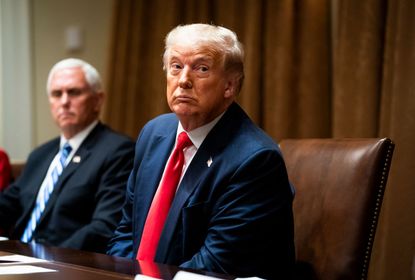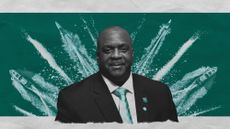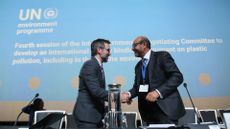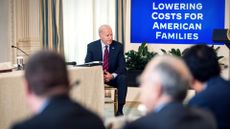Trump demands feds get a 'very substantial' cut of any Microsoft-TikTok sale, doesn't explain how that's legal


President Trump signaled Monday that he is okay with Microsoft purchasing the U.S. part of TikTok, the Chinese-owned social media company he has threatened to ban, but it will cost ... someone. First, he told reporters at the White House that if Microsoft or another U.S. company purchases TikTok by his Sept. 15 deadline, "a very substantial portion of that price is going to have to come into the treasury of the United States." Why? "The United States should be reimbursed or paid because without the United States they don't have anything," Trump said enigmatically.
"It's a little bit like the landlord-tenant," Trump explained. "Without a lease, the tenant has nothing. So they pay what's called key money or they pay something." Later Monday, Trump elaborated, arguing the U.S. "should get a very large percentage of that price," and "it would come from the sale — whatever the number is, it would come from the sale." This was an idea "nobody else would be thinking about but me," Trump said. "But that's the way I think."
"It was unclear under what authority the White House could demand such a payment," The Washington Post noted, and the Treasury Department and White House both declined to comment on Trump's proposal.
Subscribe to The Week
Escape your echo chamber. Get the facts behind the news, plus analysis from multiple perspectives.

Sign up for The Week's Free Newsletters
From our morning news briefing to a weekly Good News Newsletter, get the best of The Week delivered directly to your inbox.
From our morning news briefing to a weekly Good News Newsletter, get the best of The Week delivered directly to your inbox.
Any U.S. company that purchased TikTok would have to first get approval from the U.S. Committee on Foreign Investment (CIFUS), an interagency group that reviews proposed takeovers involving a foreign company, and lawyers familiar with CIFUS reviews told the Post the U.S. Treasury does sometime collect fees for its work, but only up to $300,000.
Microsoft said Sunday night that it is "committed to acquiring TikTok subject to a complete security review and providing proper economic benefits to the United States, including the United States Treasury," but that suggested the U.S. would benefit from future tax revenue. What Trump is demanding sounds more like muscling in for a cut of the deal. Luckily, everyone has lawyers.
Create an account with the same email registered to your subscription to unlock access.
Sign up for Today's Best Articles in your inbox
A free daily email with the biggest news stories of the day – and the best features from TheWeek.com
Peter has worked as a news and culture writer and editor at The Week since the site's launch in 2008. He covers politics, world affairs, religion and cultural currents. His journalism career began as a copy editor at a financial newswire and has included editorial positions at The New York Times Magazine, Facts on File, and Oregon State University.
-
 Andrew Fahie: the ex-BVI premier, cocaine-filled boats and drug trafficking plot
Andrew Fahie: the ex-BVI premier, cocaine-filled boats and drug trafficking plotUnder the radar Fahie's defense attorney claimed the British overseas territory leader was 'acting like the fictitious CIA agent Jason Bourne'
By Harriet Marsden, The Week UK Published
-
 Ottawa climate talks: can global plastic problem be solved?
Ottawa climate talks: can global plastic problem be solved?In the spotlight Nations aim to draft world's first treaty on plastic pollution, but resistance from oil- and gas-producing countries could limit scope
By Harriet Marsden, The Week UK Published
-
 Netherlands split on WFH for sex workers
Netherlands split on WFH for sex workersSpeed Read Councils concerned over 'nuisance' of at-home sex work, but others say changes will curb underground sex trade
By Arion McNicoll, The Week UK Published
-
 Empty-nest boomers aren't selling their big homes
Empty-nest boomers aren't selling their big homesSpeed Read Most Americans 60 and older do not intend to move, according to a recent survey
By Peter Weber, The Week US Published
-
 Brazil accuses Musk of 'disinformation campaign'
Brazil accuses Musk of 'disinformation campaign'Speed Read A Brazilian Supreme Court judge has opened an inquiry into Elon Musk and X
By Rafi Schwartz, The Week US Published
-
 Disney board fends off Peltz infiltration bid
Disney board fends off Peltz infiltration bidSpeed Read Disney CEO Bob Iger has defeated activist investor Nelson Peltz in a contentious proxy battle
By Rafi Schwartz, The Week US Published
-
 Disney and DeSantis reach detente
Disney and DeSantis reach detenteSpeed Read The Florida governor and Disney settle a yearslong litigation over control of the tourism district
By Peter Weber, The Week US Published
-
 Visa and Mastercard agree to lower swipe fees
Visa and Mastercard agree to lower swipe feesSpeed Read The companies will cap the fees they charge businesses when customers use their credit cards
By Peter Weber, The Week US Published
-
 Reddit IPO values social media site at $6.4 billion
Reddit IPO values social media site at $6.4 billionSpeed Read The company makes its public debut on the New York Stock Exchange
By Peter Weber, The Week US Published
-
 Housing costs: the root of US economic malaise?
Housing costs: the root of US economic malaise?speed read Many voters are troubled by the housing affordability crisis
By Peter Weber, The Week US Published
-
 Feds cap credit card late fees at $8
Feds cap credit card late fees at $8speed read The Consumer Financial Protection Bureau finalized a rule to save households an estimated $10 billion a year
By Peter Weber, The Week US Published